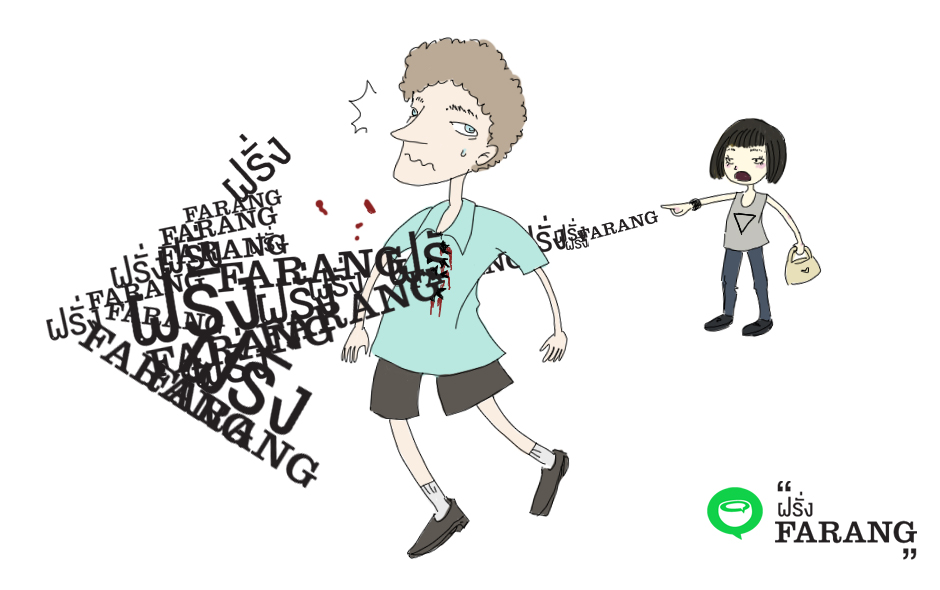Is the word “farang” racist? This is just one of many thorny issues tackled in Coconuts Bangkok writer Dan Waites’ new guide to Bangkok culture, Culture Shock! Bangkok. The latest in a long-running series, the book aims to help foreigners adapt to life in the Thai capital and make sense of what’s around them. Covering history, politics, architecture, Thai customs and belief, food, language and the practicalities of getting by in the city, the book should pique the interest of newcomers and old hands alike. The following is an excerpt from the book. Do you agree with Dan’s take on the issue?
The “f” word
Years ago a friend was working as an English teacher at a school in Sri Racha in Chonburi province, not too far from Pattaya. One of the other teachers, an older American man, complained to the management about the language the Thai teachers were using when talking about the foreign staff: namely, their constant use of the word “farang,” which has two meanings in Thai – “guava” and “white person.” This teacher thought the word was racist. The management listened to his concerns and, surprisingly, banned the Thai teachers from saying it in the school. But in the following days, my friend noticed the Thai teachers were now using a new word a lot: “baksida.” He asked his Thai girlfriend what it meant. “Oh,” she laughed. “It’s Isarn language for ‘farang.'”
“Farang” will probably be one of the first words you learn in Thai, being one of the select few Thai words that foreigners use when speaking English. While some people suppose it must be short for the Thai word “farangset” (“French”), it’s believed by scholars to derive from the Persian “farangi,” which in turn refers to the Franks, the Germanic tribe that ruled Western Europe in the Middle Ages, and from whom France gets its name. A black person from the West may be referred to as “farang dam.”
If you’re white, Thai people will use the word in your presence, whether you like it or not. And they’ll say it a lot. Most Thais argue that the word farang isn’t racist, and simply means a person of European descent. And they’re basically right. There’s nothing inherently wrong with the language having a word that means ‘white person’. And unlike some of the racial epithets that are considered offensive in polite Western society, there’s no history of oppression lurking behind “farang” that makes it offensive. The vast majority of farang in Bangkok live lives of relative privilege. An oppressed minority they are not.
Having said that, the word is probably overused. If it’s used for the purpose of distinguishing you in a crowd, it’s reasonable: “Who ordered the phad Thai?” “The farang in the corner.” But in some people’s speech, it can seem to take the place of the third person pronoun when a foreigner is present. They won’t ask their English-speaking friend what “he” said, but what “the farang” said. And when you’re the only person in the shop and still being referred to as “the farang,” it can seem like you’re having your farang-ness rubbed in your face a tad unnecessarily.
Some foreigners, like the man in the anecdote above, take exception to this. They start to consider the word to be a sort of racial slur, and demand they’re described as “khon tang chat” (literally, “different nation person”) or “khon tang prathet” (“different country person”). This is going too far. What grates on these expats – usually those who are married to a Thai, whose children are Thai nationals, and who expect to spend the rest of their life here – is the way the word functions as a constant reminder of the fact that they’re considered different. But that’s an idea you just have to accept, or you won’t be very happy in Thailand.
Farang for sale
My friend Eric recounts something that happened to him while with his Thai wife in Isarn a few years ago: “I’m on a bus sitting in a gas station in Khon Kaen when this fruit vendor motions to me [through the window] that he’s got fruit for sale. I indicate to him that I’m not interested. He makes a beeline for the bus anyway and all I hear when he gets on is, ‘farang, farang, farang.’ I turn to my wife and say, “Damn it, I told him I don’t want anything. Why does he assume the white guy wants his shit?” My wife turns to me and says: “Calm down. He’s selling guava. And he’s trying to sell it to the entire bus, you idiot.”’
Culture Shock! Bangkok, published in January 2014 by Marshall Cavendish Editions (ISBN: 978 981 4408 592), is available in all good bookstores, priced at THB695.




